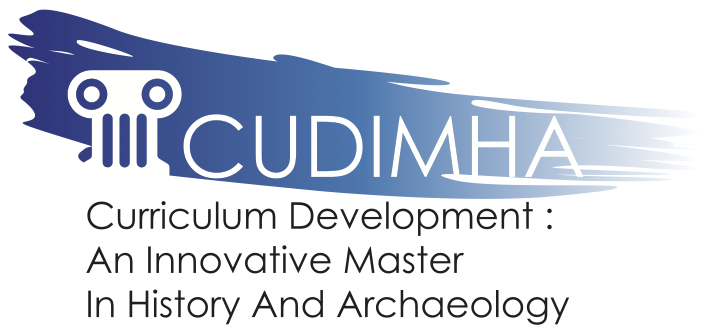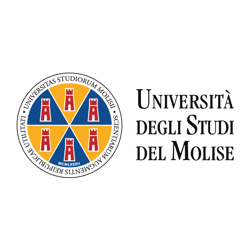
Università degli Studi del Molise
Project coordinator - WP5 leader
The University of Molise (UNIMOL), founded in 1982, has currently more than 7000 students and around 140 PhD students and post-doc research fellowships, and counts more than 1000 graduates each year. UNIMOL has six departments: Human, Education and Social Sciences; Law; Agricultural, Environmental and Food Sciences; Economics; Biosciences and Territories; Medicine and Health Sciences. The academic mission is achieved by promotion, coordination and participation in national and international research activities to increase the "know-how" in strategic scientific areas, such as cultural heritage promotion, sustainable development, agro-food production, high-tech innovation for health and economic production, environment protection. In this framework, UNIMOL has an extensive experience in the coordination and management of cooperative international funded projects (several ERASMUS + Projects inter alia).
In the framework of the activities related to the Historical and Archaeological scientific area, UNIMOL has a First-Cycle Degree Programme in Arts, Humanities, and Cultural Heritage, with two different curricula: the Historical, Literary and Language Studies Curriculum; and the Archaeology and Heritage Curriculum. The programme has a strong interdisciplinary component and emphasizes the integration of the historical-literary and the cultural heritage areas. The main objectives of the Course are training of professionals with a broad scientific and methodological background as well as in-depth knowledge of literary history, philology, history and linguistics, embracing both the classical and modern civilizations; training of professionals endowed with a basic knowledge in the fields of archaeology and history of art. Graduates will have the necessary specialized knowledge and skills in anthropology, linguistics, history, literature and art, to provide relevant expertise to local authorities and heritage bodies.
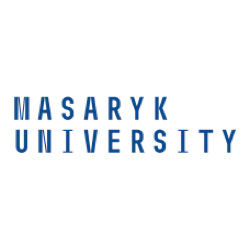
Masaryk University
Linguistic and teaching-quality support
Masaryk University, founded in 1919 in Brno, is the second largest university in the Czech Republic. It consists of 9 faculties with over 200 departments, 4,000 staff members and 35,000 students. Placing great emphasis on international cooperation, Masaryk University supports continuous exchange of knowledge, ideas and information as well as researchers, instructors and students on a worldwide scale. It offers degrees in a wide range of traditional as well as newly-emerging disciplines, runs, for example, its own polar station in the Antarctic, its own city-centre cinema, and has its own UNESCO Chair. It is currently recognized as one of the leading teaching and research institutions in Central Europe.
Masaryk University Language Centre, the largest one in the country, provides language-focused services and support for all Masaryk University students and staff members. It offers courses and support in English, French, Spanish, German, Russian, Arabic, Chinese, Swahili, Czech for Foreigners, and Latin for 10,000 students each term. The Language Centre academics, working at 9 faculty units, focus on languages for academic and specific purposes, on communication soft skills, e.g. intercultural communication, conference skills, critical thinking, academic writing, and language for employability, and on teacher training for novice academics and researchers. Thanks to the complexity of research, regular organisation of conferences and intensive production of publications, the Masaryk University Language Centre plays an important role in the language-teaching-and-learning-related innovations in Europe.
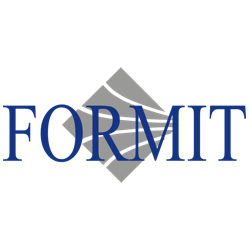
Fondazione FORMIT
Quality leader - WP3 leader
Since 1985, Fondazione FORMIT has performed several scientific research and analysis to sustain the Technology and Innovation development. FORMIT operates with a qualified multidisciplinary team, supporting National Public Administrations, the European Commission, the European Parliament and the United Nations, defining policies and related actions on a non-profit basis. FORMIT provides support to project management activities, to monitoring and quality evaluations, to the organization of on-line training activities, to the coordination of missions for training courses and to the direct communication with local stakeholders.
FORMIT collaborates also with universities, research centres, and companies worldwide implementing and managing research projects and educational initiatives. FORMIT has designed and realized an e-learning platform based on an interactive approach, which allow the just in time requirement for dynamic training activities. The scientific orientation of FORMIT is supported by its Scientific Committee, whose three members are nominated by the Italian Ministry of Research, the Italian Ministry of Foreign Affairs and the Italian Ministry of Economic Development. FORMIT carries out a relevant number of EC funded projects in the Research and Educational areas each year (28 since 2008). Furthermore, in 2004, ECOSOC (United Nations) granted FORMIT consultative status rewarding its innovation activities to sustain socioeconomic development.
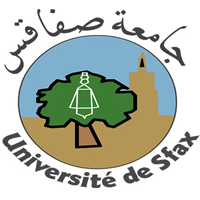
University of Sfax
Dissemination and exploitation leader - WP4 leader
The University has above 35.000 students, 2095 permanent teaching staff and 431 contractual teaching staff. The administrative staff is above 1.340 people; 56 research labs, 43 research units, 11 common services units for research, 5 doctorate schools. The University of Sfax is classified as one of the best universities in Tunisia and in the Arab region. In 2011, the University of Sfax was ranked as the best University in the Maghreb Region in terms of academic publications and research quality.
University of Sfax will host the Masters that will be the outcome of CUDIMHA project. The university will provide all the needed resources in order to allow its delivery. Teachers and researchers from Sfax University will held lectures since the University owns a Faculty of Arts and Humanities that is able to provide the necessary skills in the field for students . Thanks to its Labs, the University will develop the audio-visual aspects of Education and training during the project and master’s deployment. Moreover, Sfax University will actively contribute to and involve partners in the dissemination activities (i.e realization of dissemination materials, organization of info days etc.) since it is Dissemination and Exploitation WP leader.
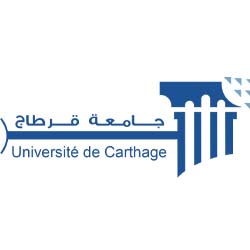
University of Carthage
Teaching content creation leader - WP2 leader
The oldest Higher Education Institution in Tunisia «National Institute of Agronomy of Tunis» INAT, which belongs to University of Carthage (UCAR), was founded in 1898, as well as the Institut Supérieur des Langues de Tunis ISLT which was founded in 1964 under the name of Bourguiba School. The University of Carthage (UCAR) which is a Tunisian public institution of education and research, separated from the University of Tunis in 1988, is under the supervision of the Ministry of Higher Education and Scientific Research. The University of Carthage was established as a multidisciplinary institution of higher learning which offers a comprehensive array of high-quality courses in basic, legal and political sciences, engineering, technology, economics and management, humanities, arts and agronomy.
The UCAR, through its various institutions, is a multidisciplinary university which delivers 303 degrees in the different levels of training, ie preparatory courses for Engineering studies and Aggregation, Fundamental Bachelor's degree (30) Applied Bachelor's degree (45) Research Master's degree (50), Professional Master's degree (47), National Diploma of Engineering (30), National Diplomas of Audiovisual (6) and Doctorates (26). The university has 2,325 permanent teachers providing researchers in addition to their mission of training and mentoring, training through research at the Graduate Schools (8) and research activities organized as part of Laboratories (39) and 'Units (27). The number of students enrolled is 35000 in different institutions spread over several sites that are deployed in the north-eastern region of the country.
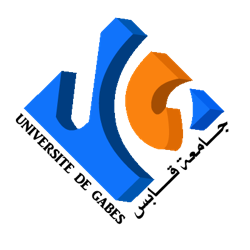
University of Gabès
Project management support
Created in 2003, Gabes University is a public institution, includes 15HEIs (1Faculty of Science, 1 National School of Engineers, 13 Higher Institutes), located in the South-East of Tunisia and covering four territorial governorates. The university offers 34 applied license degrees and 34 fundamental License degrees in various fields: sciences, engineering, computer science, economics, law and management, humanities and social studies, 19 Research Master Degrees, 31 Professional Master Degrees, Engineering Diploma in 5 specialities, 7 Doctorate graduate studies.
The number of students at Gabes University reached 14000. The staff of Gabès University is distributed as follows: 1450 academic, 710 administratif and technical staff. Research Laboratories and Units cover various areas of research embracing about 21 research laboratories and units research. The university has developed a human resources strategy in order to adapt staff skills to its activities evolution.
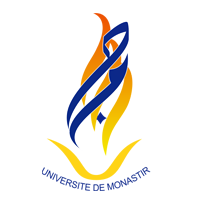
University of Monastir
Dissemination support
Despite its recent creation in 2004, a number of assets have made the University of Monastir a strong competitor in the course for the top ranking of Tunisian universities: It is a multidisciplinary university. It offers a wide range of undergraduate as well as postgraduate courses. Its institutions are distributed across two attractive, coastal, touristic and historical districts, namely Monastir and Mahdia. It is home to some of the oldest and unique academic institutions in Tunisia (the Faculty of Pharmacy and the Faculty of Dental medicine, both established in 1974). It covers a wide spectrum of research fields that range from medical studies to the arts and management with 63 research entities, and four graduate schools.
During the current academic year 2018-2019, the University of Monastir is offering 82 undergraduate courses, 39 masters and 10 postdoctoral degrees for its 4 graduate schools. The University of Monastir is particularly proud of its rich network of academic cooperation with more than 100 European universities and more than 300 universities all over the world. It has forged strong and lasting academic exchange programs with its partners through 6 joint-supervision degrees, 39 framework agreements, 19 bilateral projects which are 19 and 12 Erasmus + KA2 projects and about 20 E + KA1 projects. It maintains an active member of a large network of cooperation on the local, national and international stage. The University has made great achievements in building close ties and reinforcing cooperation with its industrial environment through administrative bodies such as the Office for the Transfer of Technology (OTT), the Career and Skills Certification Center (4C) and the Projects Network Cell (PNC).
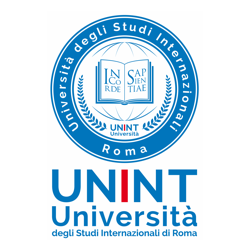
Università degli Studi Internazionali di Roma
Linguistic support
Università degli Studi Internazionali di Roma – UNINT – is the crossroads of three academic pathways that open up an international future: the Faculty of Interpreting and Translation, the Faculty of Economics, and the Faculty of Political Science. The University is at the forefront in processing issues of worldwide interest, providing students with in-depth knowledge of today’s complex and interconnected world and nurturing essential leadership skills from political, linguistic, cultural, economic and digital perspectives. The University offers interdisciplinary and job-oriented Bachelor’s and Master’s Degrees, as well as higher education programmes of outstanding quality, tailored to new opportunities and to the challenges created by globalisation.
It is well aware that today’s employers are looking for candidates with this global mindset, capable of developing interdisciplinary skills. To this end, UNINT promotes activities aimed at applying the knowledge secured in one domain to other potentially very different domains. More conventionally, as a UNINT student you will develop a number of soft skills, including leadership, public speaking, team building, elocution, cross-cultural communication and people empowerment. This distinctive educational experience fostering both internationality and interdisciplinarity is heightened by two remarkable networks: more than 70 partner universities all over the world: students enjoy access to a range of international experiences, including international study exchange or work placement abroad and Double Bachelor's and Master's Degree Programmes (the Master's Degree Programme is fully taught in English); 683 companies and institutions, providing valuable national and international internship opportunities.

University of Alicante
Guidelines development leader - WP1 leader
The University of Alicante (UA) was founded in 1979. Being one of the youngest universities in Spain, the UA is also considered one of the most innovative and fastest developing in Spain. More than 30000 national & 3000 international students are enrolled in 7 Faculties offering more than 50 degrees in all fields of study. The UA manages more than 2000 academic & 1200 administrative staff. The University has more than 70 departments & over 100 research groups in different areas of study.
The Department of Prehistory, Archaeology, Ancient History, Greek Philology and Latin Philology of the UA was formed in 1986 from the union of several knowledge areas, which at that time were separate departments. Since then, the Department has brought together the teachings for the Ancient World, although the activities of some areas go beyond this strict framework. The Department staff teaches in the Degrees in Humanities, Philology, History and Tourism and from the 2007-08 academic course, in the MA in Professional Archaeology and Heritage Management. The Department has its own Laboratories and a Library specialized in Prehistory, Archaeology and Ancient History and publishes the scientific magazine, Lucentum.
